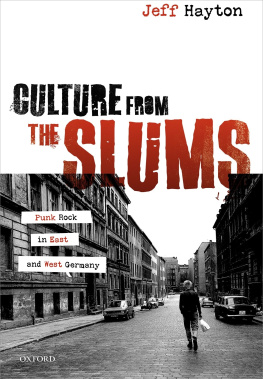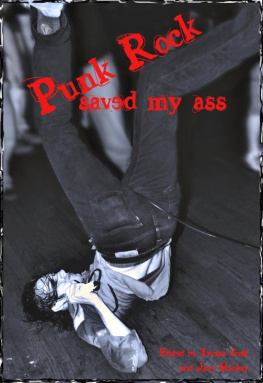Jeff Hayton - Culture from the Slums: Punk Rock in East and West Germany
Here you can read online Jeff Hayton - Culture from the Slums: Punk Rock in East and West Germany full text of the book (entire story) in english for free. Download pdf and epub, get meaning, cover and reviews about this ebook. year: 2022, publisher: OxfordUP, genre: Politics. Description of the work, (preface) as well as reviews are available. Best literature library LitArk.com created for fans of good reading and offers a wide selection of genres:
Romance novel
Science fiction
Adventure
Detective
Science
History
Home and family
Prose
Art
Politics
Computer
Non-fiction
Religion
Business
Children
Humor
Choose a favorite category and find really read worthwhile books. Enjoy immersion in the world of imagination, feel the emotions of the characters or learn something new for yourself, make an fascinating discovery.
- Book:Culture from the Slums: Punk Rock in East and West Germany
- Author:
- Publisher:OxfordUP
- Genre:
- Year:2022
- Rating:4 / 5
- Favourites:Add to favourites
- Your mark:
- 80
- 1
- 2
- 3
- 4
- 5
Culture from the Slums: Punk Rock in East and West Germany: summary, description and annotation
We offer to read an annotation, description, summary or preface (depends on what the author of the book "Culture from the Slums: Punk Rock in East and West Germany" wrote himself). If you haven't found the necessary information about the book — write in the comments, we will try to find it.
Jeff Hayton: author's other books
Who wrote Culture from the Slums: Punk Rock in East and West Germany? Find out the surname, the name of the author of the book and a list of all author's works by series.
Culture from the Slums: Punk Rock in East and West Germany — read online for free the complete book (whole text) full work
Below is the text of the book, divided by pages. System saving the place of the last page read, allows you to conveniently read the book "Culture from the Slums: Punk Rock in East and West Germany" online for free, without having to search again every time where you left off. Put a bookmark, and you can go to the page where you finished reading at any time.
Font size:
Interval:
Bookmark:


Great Clarendon Street, Oxford, OX2 6DP, United Kingdom
Oxford University Press is a department of the University of Oxford. It furthers the Universitys objective of excellence in research, scholarship, and education by publishing worldwide. Oxford is a registered trade mark of Oxford University Press in the UK and in certain other countries
Jeff Hayton 2022
The moral rights of the author have been asserted
First Edition published in 2022
Impression: 1
All rights reserved. No part of this publication may be reproduced, stored in a retrieval system, or transmitted, in any form or by any means, without the prior permission in writing of Oxford University Press, or as expressly permitted by law, by licence or under terms agreed with the appropriate reprographics rights organization. Enquiries concerning reproduction outside the scope of the above should be sent to the Rights Department, Oxford University Press, at the address above
You must not circulate this work in any other form and you must impose this same condition on any acquirer
Published in the United States of America by Oxford University Press
198 Madison Avenue, New York, NY 10016, United States of America
British Library Cataloguing in Publication Data
Data available
Library of Congress Control Number: 2021948615
ISBN 9780198866183
ebook ISBN 9780192635853
DOI: 10.1093/oso/9780198866183.001.0001
Printed and bound by CPI Group (UK) Ltd, Croydon, CR0 4YY
Links to third party websites are provided by Oxford in good faith and for information only. Oxford disclaims any responsibility for the materials contained in any third party website referenced in this work.
For my parents,
Elise de Stein and Greg Hayton
Culture from the Slums could not have been completed without the encouragement and support of my colleagues, friends, and family. Researched and written across North America and Europe, my debts are many and one of the great pleasures in completing such a big project is the opportunity to offer formal thanks to all those who contributed in ways big and small.
This book began as a dissertation at the University of Illinois in Urbana-Champaign. My advisor, Peter Fritzsche, was instrumental in challenging my ideas and pushing me toward new frames of understanding: his always insightful comments have stayed with me for a long time, and they remain imprinted on the text in all sorts of wonderful ways. At Illinois, I had the good fortune of sharing my work with many scholars and students whose consideration and critiques allowed me to transform my vague thoughts into tangible reality. Before heading off to Illinois, I was inspired to study German history by Pamela Swett, and over the years, she has become one of my closest friends, and a model of scholarly wisdom and integrity. Since arriving in Wichita, my colleagues have been incredibly supportive of my endeavors and have made Kansas a great place to teach and learn.
This book has only been possible thanks to the generosity of friends and colleagues who have volunteered their time and energy to ensure its success. Tim Brown, David Imhoff, Julia Sneeringer, Pamela Swett, and Jonathan Wipplinger, as well as four anonymous reviewers at Oxford University Press, all read parts or the whole manuscript. Their comments were critical to the final product, and I could not have asked for better readers. Over the years, I have had numerous conversations with many brilliant individuals, exchanges which have shaped my thinking about popular music and the study of history more generally. I would like to thank the following for helping me to clarify my thoughts: Celia Applegate, Julie Ault, Jovana Babovi, David Blackbourn, Timothy Brown, Mary Fulbrook, Juliane Frst, Neil Gregor, Joachim Hberlen, Scott Harrison, Seth Howes, David Imhoff, Mark Keck-Szajbel, Eric McKinley, Josie McLellan, Bodo Mrozek, Klaus Nathaus, Katherine Pence, Michael Rauhut, Martin Rempe, Eli Rubin, Detlef Siegfried, Edith Sheffer, Julia Sneeringer, Pamela Swett, Toby Thacker, Katharine White, and Jonathan Wipplinger. Without any of them, this book would be a much poorer affair. If it remains so, that of course is my fault.
In Germany, I received tremendous support from many institutions and the great people who work at them. With no punk archive, I have visited dozens of archives in the faint hope of finding traces of my subjects, and it is thanks to the professionalism and diligence of archivists at these institutions that I was able to do so. I would like to thank staff at the following archives for their generous help: Archiv der Jugendkulturen (especially Klaus Farin), Berlin; Archiv fr alternatives Schrifttum, Duisburg; Archiv fr populre Musik im Ruhrgebiet, Dortmund; Archiv fr Sozialer Bewegungen, Hamburg; Bayerischer Rundfunk, Munich; Bayerisches Hauptstaatsarchiv, Munich; Bayerisches Staatsarchiv, Munich; Bibliothek fr Bildungsgeschichtliche Forschung, Berlin; Bundesarchiv Berlin; Bundesarchiv Koblenz; Bundesbeauftragte fr die Unterlagen des Staatssicherheitsdienstes der ehemaligen DDR (especially Frau Annette Mller), Berlin; Deutsches Rundfunkarchiv, Babelsberg; Evangelisches Landeskirchliches Archiv, Berlin; Evangelisches Zentralarchiv, Berlin; Landesarchiv Baden-Wrttemberg, Hauptstaatsarchiv, Stuttgart; Landesarchiv Berlin; Landesarchiv Nordrhein-Westfalen, Duisburg; Lippmann+Rau-Musikarchiv, Eisenach; Matthias-Domaschk-Archiv in der Robert-Havemann-Gesellschaft e.V., Berlin; Niederschsisches Landesarchiv, Hannover; Norddeutscher Rundfunk, Hamburg; Schsisches Staatsarchiv, Hauptstaatsarchiv Dresden, Schsisches Staatsarchiv Leipzig; Staatsarchiv Hamburg; Stadtarchiv Dsseldorf; Stadtarchiv Essen; Stadtarchiv Hannover; Stadtarchiv Mainz; Stadtarchiv Mnchen; Stadtarchiv Stuttgart; Stadtarchiv Wuppertal; Stadtarchiv Stadt Nrnberg; and the Thringer Archiv fr Zeitgeschichte, Jena.
Over the course of my research and writing, I have also met numerous protagonists and enthusiasts from the era under study, and their assistance has been essential in my understanding of German punk. I would like to give special thanks to the following for their willingness to help a foreigner understand their culture: Christian Baumjohann, Annette Benjamin, Franz Bielmeier, Gunther Buskies, Tobias Cremer, Ray Ebert, Dirk Eisermann, Christiane Eisler, Klaus Fiehe, Bettina Flrchinger, Holger Friedrich, Ronald Galenza, Peter Hein, Alfred Hilsberg, Andreas Hhn, Michael Horschig, Annette Humpe, Burkhard Inhlsen, Axel Klopprogge, Kai-Uwe Kohlschmidt, Andi Kttner, Edmund Labont, Michael Max, Michael Mayer, Romy Meijer, Karl Nagel, Herne Pietzker, Maik Reichenbach, Ilse Ruppert, Sabine Schwabroh, Xao Seffcheque, Che Seibert, Dr. Enno Stahl, Mike Stanger, Martina Weith, Piotr Wierzbicki, and Frank Ziegert. These are their stories, and I could not have told them without their help.
This project would not have been possible without the support of the Social Sciences and Humanities Research Council of Canada, the German Academic Exchange Service, the Central European History Society, the Department of History and Graduate College at the University of Illinois at Urbana-Champaign, and the Department of History and Fairmount College of Liberal Arts and Sciences at Wichita State University. I would also like to thank the staff at the Interlibrary Loan Department of Ablah Library for their heroism in bringing obscure German publications to Kansas. My wonderful editors at Oxford University PressStephanie Ireland, Christina Wipf Perry, and Cathryn Steelewere enthusiastic about the project from the beginning and their support was essential for its completion. Brian North was a superb copy editor, Rosalba Putrino a meticulous indexer, and Scott Greenway designed a fantastic cover. Thanks especially to Bhavani Govindasamy for doing a fantastic job at getting the manuscript to final production. I have been able to present my work at numerous forums over the years and I would like to thank panelists, commentators, workshop participants, audiences, and students for all the excellent questions and debate we have had; while only a single name stands on the cover, monographs are truly collective endeavors.
Font size:
Interval:
Bookmark:
Similar books «Culture from the Slums: Punk Rock in East and West Germany»
Look at similar books to Culture from the Slums: Punk Rock in East and West Germany. We have selected literature similar in name and meaning in the hope of providing readers with more options to find new, interesting, not yet read works.
Discussion, reviews of the book Culture from the Slums: Punk Rock in East and West Germany and just readers' own opinions. Leave your comments, write what you think about the work, its meaning or the main characters. Specify what exactly you liked and what you didn't like, and why you think so.












